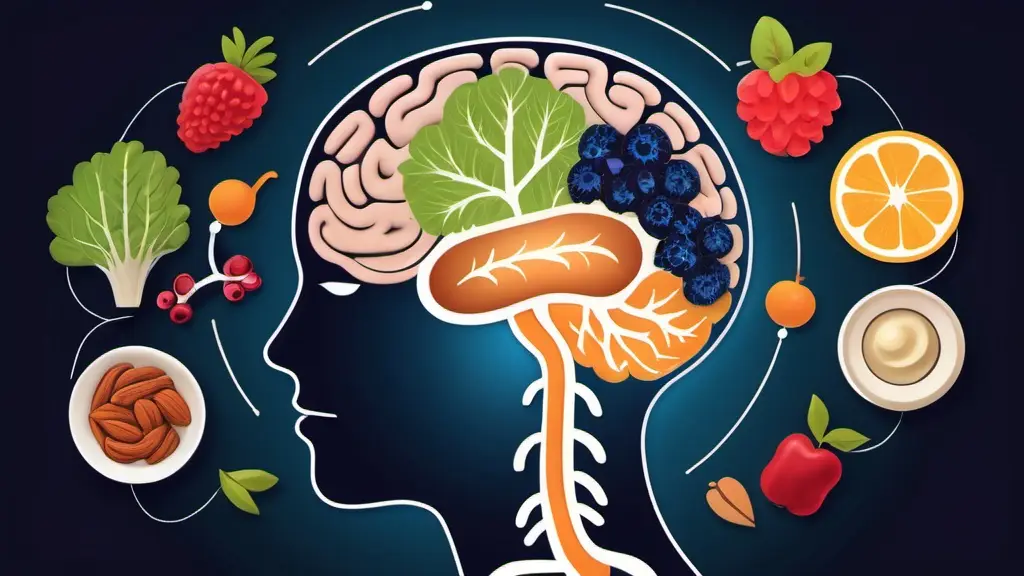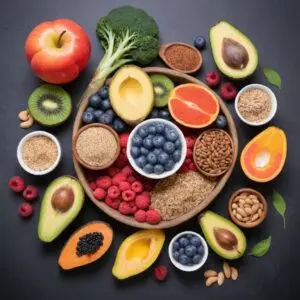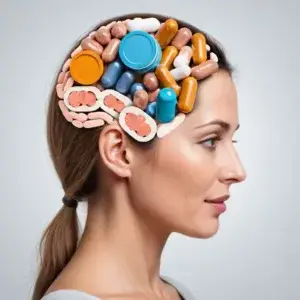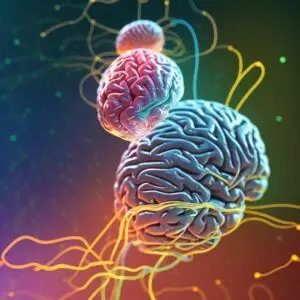Table of Contents
The relationship between our gut and brain, known as the gut-brain axis, plays a critical role in our overall health. This connection involves complex communication between the gut and brain, influencing everything from mood to mental health.
Gut health isn’t just about digestion. It directly impacts our mental well-being. A healthy gut can lead to better moods, clearer thinking, and a more stable mental state. Conversely, poor gut health is often linked with anxiety, depression, and other mental health issues.
Diet is a powerful tool for maintaining a healthy gut and a healthy mind. The foods we consume can nurture our gut microbiome—the ecosystem of bacteria in our intestines—promoting better communication between our brain and gut. By choosing the right foods, we can support and even improve our mental health.
Unveiling the Gut-Brain Axis
The gut-brain axis is a term that describes the two-way communication network between your gut and brain. This connection allows them to continuously share information, influencing each other’s function. It’s not just the brain sending signals to the gut—your gut can communicate back, impacting how you feel mentally and emotionally.
Gut bacteria, also known as gut microbiota, play a crucial role in this communication. These tiny organisms help produce neurotransmitters like serotonin, often called the ‘feel-good’ hormone. In fact, a significant portion of serotonin is produced in the gut. This means that the health and balance of your gut bacteria can directly affect your mood and emotional health.
The gut-brain connection is evident in its impact on mental disorders. Research shows that gut health is linked to conditions like anxiety, depression, and even stress levels. When your gut bacteria are out of balance, it can lead to inflammation and other issues that may worsen these mental health conditions.
Understanding how gut bacteria influence mental states is key. The gut produces several neurotransmitters aside from serotonin, including dopamine and gamma-aminobutyric acid (GABA), which are essential for mood regulation and stress response. By maintaining a healthy gut, you’re not just aiding your digestive system but also nurturing your mental health.
Power Foods: Boosting Gut and Mental Health
Diet plays a pivotal role in gut and brain health. Certain foods can help maintain a healthy gut, which in turn supports mental well-being.
- Probiotic-Rich Foods: Probiotics are beneficial bacteria that help restore the natural balance of gut bacteria. Foods like yogurt, kefir, sauerkraut, kimchi, miso, and kombucha are great sources of probiotics. Incorporating these can aid digestion and positively influence your mood.
- Prebiotic Foods: Prebiotics are the food for your good gut bacteria. They help these beneficial microorganisms thrive. Foods rich in prebiotics include bananas, garlic, onions, leeks, asparagus, and dandelion greens. Adding these to your diet supports a healthy gut environment.
- Omega-3 Fatty Acids: Omega-3s are known for their anti-inflammatory properties and brain-boosting benefits. Consuming fatty fish like salmon and mackerel, or plant-based sources like flaxseeds, chia seeds, and walnuts, can support brain health and reduce inflammation, which positively affects mood and cognitive functions.
- Fermented Foods: Fermented foods are another excellent source of beneficial bacteria. Tempeh, pickles, natto, and other fermented vegetables can help balance your gut microbiome, supporting both digestive health and mental clarity.
- Fibre-Rich Foods: A diet high in fiber is essential for a healthy gut. Foods like whole grains, oats, beans, legumes, and leafy greens promote gut health by aiding digestion and feeding beneficial bacteria. Maintaining a fiber-rich diet can indirectly support mental health by ensuring a well-functioning digestive system.
Inflammation and Its Impact on Mental Health
Poor gut health often leads to inflammation, which can affect the brain. The gut and brain are connected in such a way that when something inflames the gut, it can also lead to brain inflammation. This inflammation can contribute to various mental health issues, including anxiety, depression, and even cognitive decline.
Following a diet rich in anti-inflammatory foods can help manage and reduce these symptoms. Foods like berries, turmeric, and green tea are particularly effective. Berries are packed with antioxidants and vitamins that help fight inflammation and protect brain function. Turmeric, known for its active compound curcumin, has strong anti-inflammatory and antioxidant effects, beneficial for brain health. Green tea contains compounds like catechins, which are also potent antioxidants, promoting overall brain health.
Antioxidants play a crucial role in reducing oxidative stress in the brain. Oxidative stress occurs when there’s an imbalance between free radicals and antioxidants in your body, leading to inflammation and tissue damage. Consuming foods high in antioxidants helps neutralize free radicals, ultimately supporting mental well-being.
By prioritizing anti-inflammatory and antioxidant-rich foods, you’re not just soothing the gut, but also creating a healthier environment for the brain. This dual approach can lead to noticeable improvements in mood, cognitive function, and overall mental health.
Foods to Avoid for a Healthy Gut and Mind
Some foods can negatively impact both gut and mental health. Avoiding certain items can help maintain a balanced gut and stable mental state.
Highly Processed Foods: Fast food, packaged snacks, and sugary cereals often contain unhealthy fats, artificial additives, and low nutritional value. These foods can lead to inflammation and disrupt gut health, negatively affecting mental well-being.
Artificial Sweeteners: Aspartame, sucralose, and other artificial sweeteners can disrupt the balance of gut bacteria, leading to digestive issues and mental health problems. Opt for natural sweeteners like honey or maple syrup instead.
Excessive Sugar: High sugar intake harms gut health by feeding harmful bacteria and fungi, leading to an imbalance. This can result in mood swings and cognitive decline. Reducing sugar consumption can help stabilize both gut and mental health.
Steering clear of these harmful foods and making mindful dietary choices helps create an environment where your gut and brain can thrive.
Lifestyle Tips for Optimal Gut and Brain Health
Lifestyle habits play a crucial role in maintaining both gut and mental health. Consider these strategies for a healthier gut-brain connection.
- Stress Management: Chronic stress can wreak havoc on your gut and mind. Practices like meditation, deep breathing exercises, and regular physical activity can help manage stress levels. Finding ways to relax and unwind supports both gut and brain health.
- Getting Enough Sleep: Quality sleep is essential for gut health and mental well-being. Aim for 7-9 hours of uninterrupted sleep each night. Establish a bedtime routine, minimize screen time before bed, and create a comfortable sleeping environment to improve sleep quality.
- Physical Activity: Regular exercise promotes a healthy gut microbiome and enhances mental health. Activities like walking, cycling, and yoga can boost endorphin levels, improve mood, and support a balanced gut microbiome.
- Balanced Diet: Alongside specific gut-friendly foods, maintaining an overall balanced diet ensures your body gets the necessary nutrients to function optimally. This holistic approach supports both gut and brain health.
Making these lifestyle changes can help manage and improve gut and mental health, creating a positive feedback loop for overall well-being.
Resources
1. The Gut-Brain Axis and Mental Health
- Study: “The Microbiome-Gut-Brain Axis: From Neurology to Psychiatry”
- Link: https://www.ncbi.nlm.nih.gov/pmc/articles/PMC5609090/
- Summary: This study explores the communication pathways between the gut and the brain and their effects on neurological and psychiatric health.
2. Serotonin Production in the Gut
- Study: “The Gut-Brain Axis: The Role of the Enteric Microbiota in the Regulation of Gastrointestinal and Cognitive Function”
- Link: https://www.ncbi.nlm.nih.gov/pmc/articles/PMC4367209/
- Summary: Discusses how gut bacteria play a crucial role in the production of serotonin, which is linked to mood regulation.
3. Probiotics and Mental Health
- Study: “Effects of Probiotics on Depression: A Systematic Review and Meta-Analysis of Randomized Controlled Trials”
- Link: https://www.frontiersin.org/articles/10.3389/fpsyt.2019.00481/full
- Summary: Investigates the positive effects of probiotics on mental health, particularly in alleviating symptoms of depression.
4. Prebiotics and Gut Health
- Study: “Prebiotic Intake Reduces the Waking Cortisol Response and Alters Emotional Bias in Healthy Volunteers”
- Link: https://www.ncbi.nlm.nih.gov/pmc/articles/PMC4378079/
- Summary: This study examines how prebiotic consumption can reduce stress and influence emotional well-being through the gut-brain axis.
5. Omega-3 Fatty Acids and Brain Health
- Study: “Omega-3 Fatty Acids in Major Depressive Disorder: A Comprehensive Meta-Analysis of Randomized Clinical Trials”
- Link: https://www.ncbi.nlm.nih.gov/pmc/articles/PMC6115019/
- Summary: Highlights the benefits of omega-3 fatty acids in improving mental health, particularly for mood disorders such as depression.
6. Fiber and Gut Health
- Study: “Dietary Fiber and the Gut Microbiota: Translating Preclinical Findings to Human Studies”
- Link: https://www.ncbi.nlm.nih.gov/pmc/articles/PMC6722886/
- Summary: Discusses the role of dietary fiber in promoting gut health, which in turn benefits mental well-being.
7. The Role of Inflammation in Mental Health
- Study: “Inflammation and Its Discontents: The Role of Cytokines in the Pathophysiology of Major Depression”
- Link: https://www.ncbi.nlm.nih.gov/pmc/articles/PMC3491551/
- Summary: This article connects chronic inflammation to mental health disorders, highlighting how diet can help manage inflammation.
8. Impact of Processed Foods on Mental Health
- Study: “The Influence of Processed Foods on the Gut Microbiome and Depression”
- Link: https://www.ncbi.nlm.nih.gov/pmc/articles/PMC7271975/
- Summary: Examines the relationship between a processed food diet, gut microbiota imbalances, and mental health issues like depression.
9. Artificial Sweeteners and Gut Health
- Study: “Artificial Sweeteners Induce Glucose Intolerance by Altering the Gut Microbiota”
- Link: https://www.nature.com/articles/nature13793
- Summary: Demonstrates how artificial sweeteners can negatively affect the gut microbiome, leading to metabolic and mental health problems.
10. Stress, Gut Health, and Mental Well-Being
- Study: “Stress and the Microbiome-Gut-Brain Axis in Visceral Pain: Relevance to Functional Bowel Disorders”
- Link: https://www.ncbi.nlm.nih.gov/pmc/articles/PMC6176019/
- Summary: Explores how stress affects the gut-brain axis and contributes to disorders like anxiety and depression.
11. Exercise and the Gut Microbiome
- Study: “Exercise and the Gut Microbiome: A Review of the Evidence”
- Link: https://journals.physiology.org/doi/full/10.1152/japplphysiol.00474.2017
- Summary: Highlights how regular physical activity promotes gut health and mental well-being by improving the diversity of gut bacteria.







